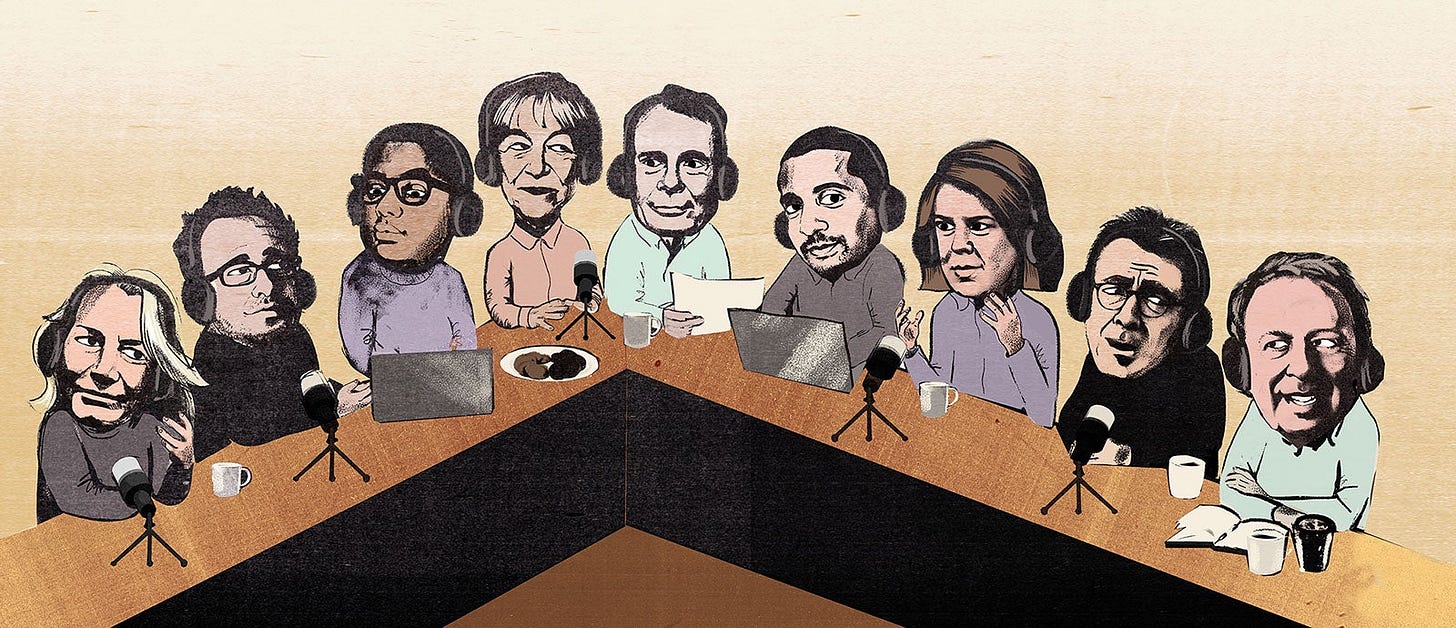Happy Friday!
It’s the 110th anniversary of the New Statesman this month—happy birthday, old friend!—and the magazine convened its current and former political editors for a podcast to talk about what’s changed in politics and journalism during their lifetimes. We get through 9/11, the Blair-Brown wars, the arrival of blogs and Twitter, the fall of the Lib Dems, the Corbyn-era extinction of sources, and the long Conservative hegemony.
The written version is here, where you can enjoy me saying things like, “It was a fashion for a while to have journalists and politicians chumming up to each other on Twitter, and quite quickly I think everybody realised that it was quite bad to show people the way the sausage was made. It significantly reduced their trust in the integrity of the sausage.” Why am I like this????
There’s also a video highlights reel which starts with me talking about the time we sent Hugh Grant undercover to bug the guy who bugged him.
Helen
The Stormy Daniels Story (New York)
She was invited to dinner with [Trump] by his longtime bodyguard, Keith Schiller. She didn’t hide it. She told her boyfriend as well as several friends and work acquaintances also in Lake Tahoe. She declined Schiller’s offer to send a car to retrieve her and bring her to Trump’s hotel. She put on her favorite gold dress and strappy gold heels and walked over. Schiller directed her to enter the penthouse, one of those big suites with its own living and dining room, where she found Trump meandering in black silk pajamas. She was furious, she recalled. She mocked him, comparing him to Hugh Hefner, and told him to change. He obliged. He returned, chastened, in his uniform of dark suit and tie. When he spent too much time bragging about himself and showing off a magazine with his face on the cover, she ordered him to bend over and “drop ’em.” He did. She rolled up the magazine and spanked him with it. It wasn’t sexual, she said. It was purely a battle of egos. She won, she thought.
Completely floored by the revelation that Trump might go to prison for re-enacting the Ballad of Barry and Freda.
How Fox News Chased Its Viewers Down The Rabbit Hole (New York Times)
Fox’s opinion hosts were drawing ever closer to Trump’s inner circle, and their bosses seemed less willing than ever to pull them back. In one especially striking moment at a rally for the 2018 midterm elections, [Sean] Hannity stood next to Trump at his presidential lectern, pointed to the reporters in the back of the hall — including Fox’s Kristin Fisher — and called them “fake news.” The reporters on the news side were furious. The network issued a tepid statement that it did not “condone talent participating in political events.” During a lunch with Suzanne Scott and Jay Wallace, Fox News’s executive editor, the network’s leading news anchors — among them Chris Wallace, Bret Baier and Martha MacCallum — urged the bosses to bring disciplinary action. But nothing appeared to come of it. Hannity continued to help Trump into the next campaign year, even as the brand-name journalists were heading for the door.
The Dominion lawsuit against Fox News—alleging that the network is guilty of libel through “actual malice” by reporting that its voting machines were insecure when it knew they weren’t—has provided an incredible insight into how Fox operates. The text messages alone are jaw-dropping. Here’s Rupert Murdoch to the Fox CEO in January 2021: “Trump insisting on the election being stolen and convincing 25% of Americans was a huge disservice to the country . . . Pretty much a crime. Inevitable it blew up Jan. 6th.”
Pretty much a crime. That’s stronger than the way the NYT or CNN would put it!
This bit also made something click for me: “After the Sept. 11 attacks, [Roger] Ailes embraced the rising nationalism of his viewers, maintaining, as his anchors began wearing American-flag lapel pins, that Fox would not go looking for stories that put a nation at war in a negative light. There would be no crying about civilian deaths in the invasions of Afghanistan and Iraq, no knee-jerk second-guessing of the Bush administration. ‘I don’t believe that democracy and terrorism are relative things you can talk about, and I don’t think there’s any moral equivalence in those two positions,’ Ailes told me at the time.”
Huh. I never thought of this before, but I guess my journalism has always been shaped by becoming an adult at the time of the Iraq War, the last great instance of “No Debate”.
PS. For those of you who want grubby gossip instead of Serious Insights Into Journalism, Vanity Fair has published a barn-burner of a piece which claims that part of Murdoch’s divorce settlement with Jerry Hall was that she wasn’t allowed to feed plotlines to the writers of Succession. That kind of foresight and strategic thinking is why he’s a billionaire and you’re not.

Motherloading: Inside the Surrogacy Boom (The Free Press)
While there’s beauty and generosity in the new surrogacy market, there’s also something very jarring about it. For starters, there are the eyebrow-raising optics—the poor catering to the rich; the religious serving the secular; the Americans, Asians, and Europeans flocking south in search of often non-white women to carry their babies. Then there are the technically legal but morally nebulous situations surrogates find themselves facing. After one surrogate gave birth—the parents were absent—she learned she was one of three women they’d hired simultaneously. (The couple had wanted triplets.) I heard of another surrogate who was asked to carry a baby for a single, elderly man.
BRRRRRRRRR. Great reporting from The Free Press on an issue that’s becoming more acute here too, as the Law Commission is looking into Britain’s surrogacy regime (only altruistic surrogacy is currently allowed). James Kirkup had a very good piece this week about the fact that, as with the gender debate before it, feminist concerns are simply being ignored because they’re awkward (and about women).
There’s a quote in the FP piece which I find pretty chilling, particularly given the economic inequalities involved: “When the baby inside her belongs to someone else, who does she belong to?”
Quick Links
“Whatever the new elite is, I’m probably a member of it. I went to Oxford and then made a career out of talking about whether the external world really exists independently of the mind or not, so I don’t think there is any way out for me on this. The majority of my university contemporaries are now at the peak of successful and lucrative senior careers. To my knowledge, only one person from my college year group is unemployed—and that’s Dominic Cummings.” Kathleen Stock’s dissection of Matthew Goodwin’s “New Elites” is also very funny on her Gen X graduate peers (Unherd).
Jorge Luis Borges tells William Buckley why he loves the English language more than Spanish. If anyone finds the full interview of this, do let me know (twitter).
Also, if you’ve never read any Borges—give him a whirl! He was a master of the short story: try “Funes the Memorious”—about a man who can’t forget anything— or “The Garden of Forking Paths.” There’s a good selection of the stories collected in Fictions.
“The term parasocial interaction was introduced in the 1950s by the social scientists Donald Horton and R. Richard Wohl. It was the early days of home television, and they were seeing people develop an intimate sense of relationship with actors who were appearing virtually in their home. Today, the definition is much broader. After all, actors, singers, comedians, athletes, and countless other celebrities are available to us in more ways than ever before. Forming parasocial bonds has never been easier.” Ugh. Apparently I have to stop hate-reading my internet lolcows and get some real friends. Gross. (The Atlantic)
Ian Leslie profiles Keir Starmer, the undersharing tortoise (The Ruffian).
“I wish Mark had been able to tell me what he planned to do, and I had been able to say goodbye properly. I wish I had sat beside him when he died. I wish I had held his hand as he dropped from consciousness, from pain, from life.” I’m extremely conflicted on assisted dying—Canada seems to have gone crazy—but stories like this also weigh on me (The Guardian).
“Why is it invariably the liberals who are to blame, even for the fact that so many centre right people have in recent times, moved almost to the far right? Yet the reverse is never suggested—that the actions of the right and centre right are responsible for the reaction of liberals and the Left.” David Aaronovitch pushes back on the thesis that, in the last decade, the left became radicalised while the right has stayed still (Notes from Underground, Substack).
Plugging corner: Hadley Freeman’s Good Girls is now out, and it’s excellent. Recommended for anyone who has had an eating disorder, or knows anyone with one—or anyone worried about teenage girls and how they can turn their pain in on themselves.
“Bemused Australians in the New Hebrides renamed the Condominium “the Pandemonium”—which was understandable when one country has two police forces with different uniforms, two health systems and two entirely distinct systems of law. To add confusion, the two police forces would regularly swap duties to not give any impression of seniority.” Ned Donovan on Vanuatu, which the British and French tried to co-rule, with disastrous results (Terra Nullius).
I can no longer embed tweets, but this is a good tweet.
Housekeeping: The Bluestocking has seen some impressive growth in the last few months, much like my waistline over the pandemic. To welcome new readers, I thought I would do an AMA—ask me anything—edition in a few weeks’ time. Keen to seek my oracular wisdom on any subject? Leave a question in the comments or hit reply to this email.
In other good (?) news, I’ve made some excellent job-related changes in the last few weeks and so will not be creating any kind of paid tier for the foreseeable future. I’m kinda happy about this, because customer service saps the joy out of everything. So please continue to enjoy the Bluestocking for free, and encourage your friends to subscribe.
See you next time!






Excellent news about keeping it free, thank you so much. I really want to support all writers whose Substacks I enjoy, but it’d mean spending £££ per month. So what happens is that a few make a lot, or enough to make a decent living, the majority make very little, if at all. Wish Substack would come up with a more equitable solution.
PS. I feel exactly the same about assisted dying. As a mother of a young autistic man with learning difficulties, I abhor what’s happening in Canada, but find some of the pro arguments compelling.
My question: what would you like to write about next (after your book about geniuses, I mean)? As in what would you like to write about, even if you might ultimately end up writing about something else.
I think this is the full Jorge Luis Borges interview on YT. I loved the clip!
https://youtu.be/bNxzQSheCkc